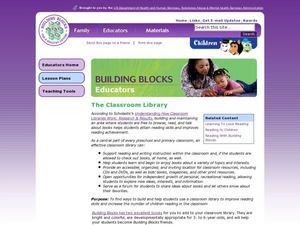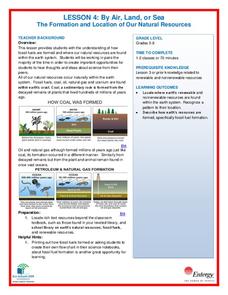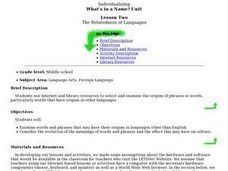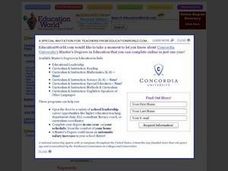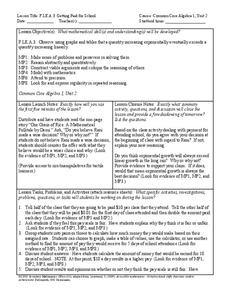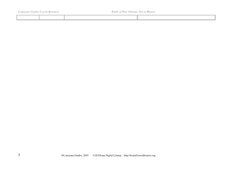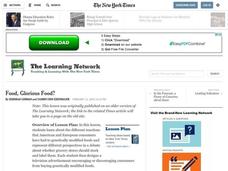Education World
Edible Resource Maps!
Young scholars discuss resource maps and examine examples from library resources. Working in groups, they create edible resource maps by drawing examples, such as popcorn on the border of Iowa and Nebraska. Then they use cookies in the...
Curated OER
The Classroom Library
Youngsters visit the classroom library to complete various reading activities, pushing their motivation to read! They will discuss different library books and read two specific books that use "Building Block" reading skills. They also...
Curated OER
Save the Library!
Students discuss library resources and how to locate them by answering various scenarios. Role-playing as librarians, they write essays stating five reasons why the library should not be closed down.
National Wildlife Federation
By Air, Land, or Sea: The Formation and Location of Our Natural Resources
Coal forms from the ancient remains of plants that were alive on Earth before the dinosaurs! Scholars use their t-charts from the previous lesson plan over resources and research to determine if their information is correct. Through...
Curated OER
Three Little Pigs: Human, Natural and Capital Resources
First and second graders will learn about natural, capital , and human resources through the story The Three Little Pigs. They will listen to the story, write down what they know about straw, wood, and brick, then complete a chart...
Curated OER
The Relatedness of Languages
Students use Internet and library resources to select and examine the origins of phrases or words, particularly words that have origins in other languages.
Curated OER
Library Curriculum: What Would a Wonderful Library Be Like?
Second graders complete a KWL chart about libraries. They create a book using writing patterns of a particular author. Students decide criteria for awarding the Second Grade Librarian Award to books in the classroom library, and use a...
West Contra Costa Unified School District
Mixture Problems
Mix up your lessons with the resource on mixture problems. Scholars use manipulatives to model and solve mixture problems. Individuals then set up both one- and two-variable equations to solve the problems.
Facing History and Ourselves
Life for German Youth in the 1930s: Education, Propaganda, Conformity, and Obedience
The German youth faced an onslaught of propaganda when they went to school, thanks to the Nazi regime led by Hitler during World War II. Pupils relate their education experiences to German youth by analyzing primary source readings,...
Curated OER
"Me" Resource
Learners elucidate themselves by writing up to six entries in different formats. Some formatting choices include a dictionary, encyclopedia, or atlas entry, a magazine article, a newspaper article, and a table of contents. Some...
Facing History and Ourselves
Responding to Difference in Democracy
Disagreements happen in a diverse democracy. It's what people do about these differences in a diverse society that the resource models. After listening to an eight-minute podcast about a woman who collaborated with people who have very...
Curated OER
Library Media: Poetry
Fifth graders explore different kinds of poetry. They work in groups to collect different styles of poetry. Then they use charts to organize the attributes of various poems. Conclude the lesson by having each individual choose the style...
Facing History and Ourselves
When Differences Matter
Jane Elliott's controversial blue eyes/brown eyes experiment detailed in the film A Class Divided leads to a discussion of privilege, social power, and opportunity. Viewers note how the children react to the experiment, share their...
Facing History and Ourselves
The Nazis in Power: Propaganda and Conformity
The Nazis used the power of propaganda to encourage confirmative views and the discrimination of Jews. A social studies resource illustrates these issues through discussion, image analysis, and a writing exercise.
Facing History and Ourselves
After Charlottesville: Contested History and the Fight against Bigotry
History doesn't always reflect all sides. Academics discover how the remembered history of the Civil War differs for White and African Americans. The instructional activity explores how Civil War monuments and celebrations have racist...
Middle Tennessee State University
The Invention of the Telephone
All of the people in your class would agree that life would be different without the invention of the telephone! Study Alexander Graham Bell's most famous and influential invention through the primary source document of his sketch of the...
Curated OER
For the Birds
Second graders observe, identify, and document birds sighted at the library feeder station. They observe and document birds in order to begin their birder's life list. They apply scientific concepts and principles by using library...
Penguin Books
Wonder in the Classroom
Would you rather be right, or would you rather be kind? A novel unit based on R.J. Palacio's Wonder focuses on the need to be kind to others and to accept their differences. As learners read the book, they discuss the themes of family...
Scholastic
Ready to Research Owls
Researching facts about owls can be a hoot for your class. Let them wisely collaborate on this writing project. The resource is the second part of three parts. It is best to use all three lessons in order.
Howard County Schools
Getting Paid for School
What if you were paid to attend class? What kind of payment schedule would you choose? Learn how exponential functions will eventually exceed linear functions by comparing two different payment schedules for attending class.
Curated OER
History Did Happen in My Back Yard!
Eighth graders interpret historical evidence presented in primary resources. In this Louisiana history lesson, 8th graders research their parish history using the LOUISiana Digital Library resources. Students create multimedia...
Curated OER
Use Or Abuse?
Students explain the meaning of "use value" of nature's resources by researching and writing studenT books personifying an aspect of nature. They produce public service announcements regarding use value for their local community.
University of Pennsylvania
Decoding Propaganda: J’Accuse…! vs. J’Accuse…!
Reading snail mail is a great way to go back into history and to understand others' points of view. The resource, the second in a five-part unit, covers the Dreyfus Affair. Scholars, working in two different groups, read one letter and...
Curated OER
Food, Glorious Food?
How are the reactions between American and European consumers different when it comes to genetically modified foods? Use the New York Times article "Consumers in Europe Resist Gene-Altered Foods" to inform your middle schoolers about the...



